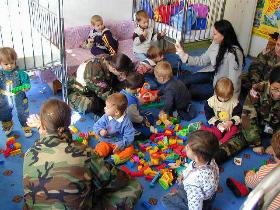General

Military Cultural Competence for Child Care Providers
The ongoing mobilization of National Guard and Reserve forces makes it likely that even child care providers who do not work near a military installation either are currently caring for a military connected child or will care for one in the future. The first module of this E-Learning series is designed to help center and family home child care professionals provide culturally competent, responsive care for military families and their children.
Military Culture 101: In order to work effectively with families and honor their military service, child care providers need a basic understanding of military culture and military family life. This learning module will introduce child care providers to characteristics of the United States Military system and the unique qualities of military family life.
Supportive Child Care for Military Families: All families experience stressful times. For military families those stressful times may happen more frequently, last longer, or occur in conjunction with other unique challenges associated with military service. This learning module will examine the effect of stress on children's development and behavior and provide strategies that child care providers can use to support the military connected children in their care.
This Learning Series was developed by eXtension Alliance for Better Child Care (EABCC):
Jane Lanigan, Ph.D,Associate Professor, Washington State University
Diane Bales, Ph.D, Associate Professor, University of Georgia
Kathy Reschke, Ph.D, Concentration Leader, EABCC
In collaboration with the Department of Defense
Eddy Mentzer, CIV OSD PR